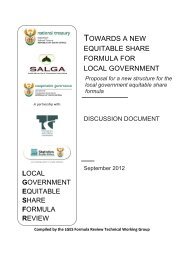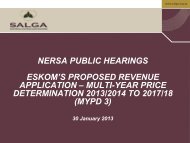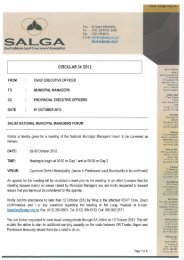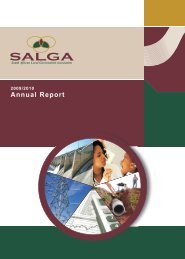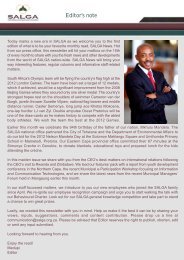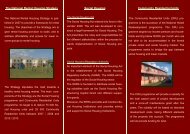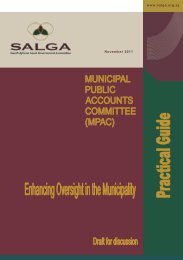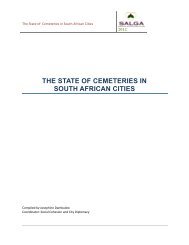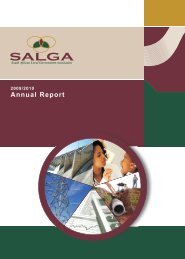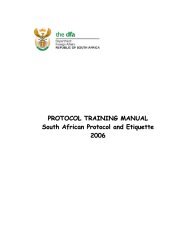Download - SALGA
Download - SALGA
Download - SALGA
- No tags were found...
You also want an ePaper? Increase the reach of your titles
YUMPU automatically turns print PDFs into web optimized ePapers that Google loves.
PRIORITY OBJECTIVE 5:<br />
LABOUR RELATIONS A PRODUCTIVE,<br />
STABLE LABOUR ENVIRONMENT,<br />
SUPPORTED BY A MUTUAL<br />
GAINS APPROACH<br />
<strong>SALGA</strong> fully achieved 18 of the 22 targets set in this area and<br />
continues its strive to improve labour relations with a view to creating<br />
a productive, stable labour environment supported by a mutual<br />
gains approach.<br />
<strong>SALGA</strong> 2010-11 Institutional Scorecard by KPA<br />
Priority Objective 05 - Labour Relations<br />
Fully Achieved - 18<br />
82%<br />
Not Achieved - 1<br />
4%<br />
Partially Achieved - 3<br />
14%<br />
Conclusion of SALGBC Disciplinary Procedure Collective Agreement<br />
and Wage Curve Collective Agreement<br />
Parties of the South African Local Government Bargaining Council<br />
(SALGBC) entered into the Disciplinary Procedure Collective<br />
Agreement and the Wage Curve Collective Agreement in order to<br />
ensure a predictable, consistent and certain discipline regime for all<br />
employees of local government, and thereby more disciplined and<br />
productive employees.<br />
Supporting and providing labour relations advice to municipalities<br />
<strong>SALGA</strong> Eastern Cape provided advice to municipalities on labour<br />
related matters and led and concluded negotiations and collective<br />
agreement with regard to divisional conditions of services with the<br />
SALGBC, the South African Metal Workers Union (SAMWU) and the<br />
Independent Municipal and Allied Trade Union (IMATU), effective<br />
01 April 2011 - 31 March 2016. Additionally, all wage curve and<br />
disciplinary procedures were concluded and a draft policy on HIV /Aids<br />
in the work place was also developed in partnership with the unions<br />
within SALGBC and will be implemented in the next financial year.<br />
Various municipalities were assisted and represented in the SALGBC<br />
dispute resolution processes and internal municipal disciplinary in<br />
the areas of arbitration (seven cases), conciliation (15 cases) and<br />
discipline (10 cases).<br />
<strong>SALGA</strong> Mpumalanga fulfilled its mandate of representing member<br />
municipalities in a number of areas, including the 09 December<br />
2010 SALGBC meeting where all 21 municipalities were represented.<br />
A further seven municipalities, namely Mbombela, Albert Luthuli,<br />
Emalahleni, Emakazeni, Nkomazi, Dr JS Moroka and Bushbuckridge<br />
were represented on disciplinary hearings, four on HR issues, namely<br />
Mkhondo, Nkomazi, Victor Khanye and Mbombela, eight on capacity<br />
programmes focusing on IDP and two on the Executive Leadership<br />
Municipal Development Programme (ELMDP), with further assistance<br />
being provided on the National Certificate in Municipal Governance,<br />
the LED programme, the Gender Mainstreaming for Local Government<br />
(GEMLOG) training programme, the Certificate in Financial Accounting<br />
and the marketing programme. Overall, over 200 officials and<br />
councillors were capacitated through these programmes and Mkhondo<br />
and Mbombela Municipalities were supported on the functionality of<br />
the Local Labour Forum (LLF), with the LLFs of seven municipalities<br />
now being functional.<br />
<strong>SALGA</strong> Western Cape represented and assisted municipalities with 29<br />
internal disciplinary processes, namely Theewaterskloof (three cases),<br />
Matzikama (six cases), Oudtshoorn (four cases), Saldanha Bay (three<br />
cases), Drakenstein (three cases), Hessequa (one case), Overberg<br />
(one case), Witzenberg (one case), Bergrivier (four cases), Central<br />
Karoo (one case), Overstrand (one case) and Cape Agulhas (one<br />
case). Further, following on a decision by the Premier’s Coordinating<br />
Forum, the Office of the Premier requested <strong>SALGA</strong> Western Cape<br />
to give input on its formulated draft Sexual Harassment Policy. The<br />
document was sent to municipalities for their input, after which the<br />
inputs were considered and adopted by the HR Practitioners Forum<br />
and then by the Human Resources Development Working Group.<br />
The working group decided that the task team of the HR Practitioners<br />
Forum should ensure that all the inputs were contained in the<br />
document before being sent to the Office of the Premier and they<br />
met on 03 November 2010 before sending the draft document with<br />
<strong>SALGA</strong>’s input to the Office of the Premier. The Human Resources<br />
Development Working Group also resolved that an employee wellness<br />
policy and an overtime policy for municipalities should be developed<br />
and the task team of the HR Practitioners Forum also prepared<br />
these two policies for consideration. The Steering Committee of<br />
the Municipal Professionalisation Programme was attended on<br />
08 February 2011 in order to discuss the progress of the programme<br />
and the terms of reference for possible service providers. <strong>SALGA</strong>, the<br />
Institute for Local Government Management (iLGM), the Department<br />
of Cooperative Governance (DCOG), German Technical (GIZ), the<br />
Provincial Government of the Western Cape (PGWC) and Mr Johnny<br />
Douglas from the Municipal Managers Forum were in attendance, and<br />
a meeting also took place with the Universities of Western Cape and<br />
Stellenbosch when they were briefed about the programme and what<br />
would be expected of the preferred service provider.<br />
<strong>SALGA</strong> Annual Report | 2010/11<br />
41



